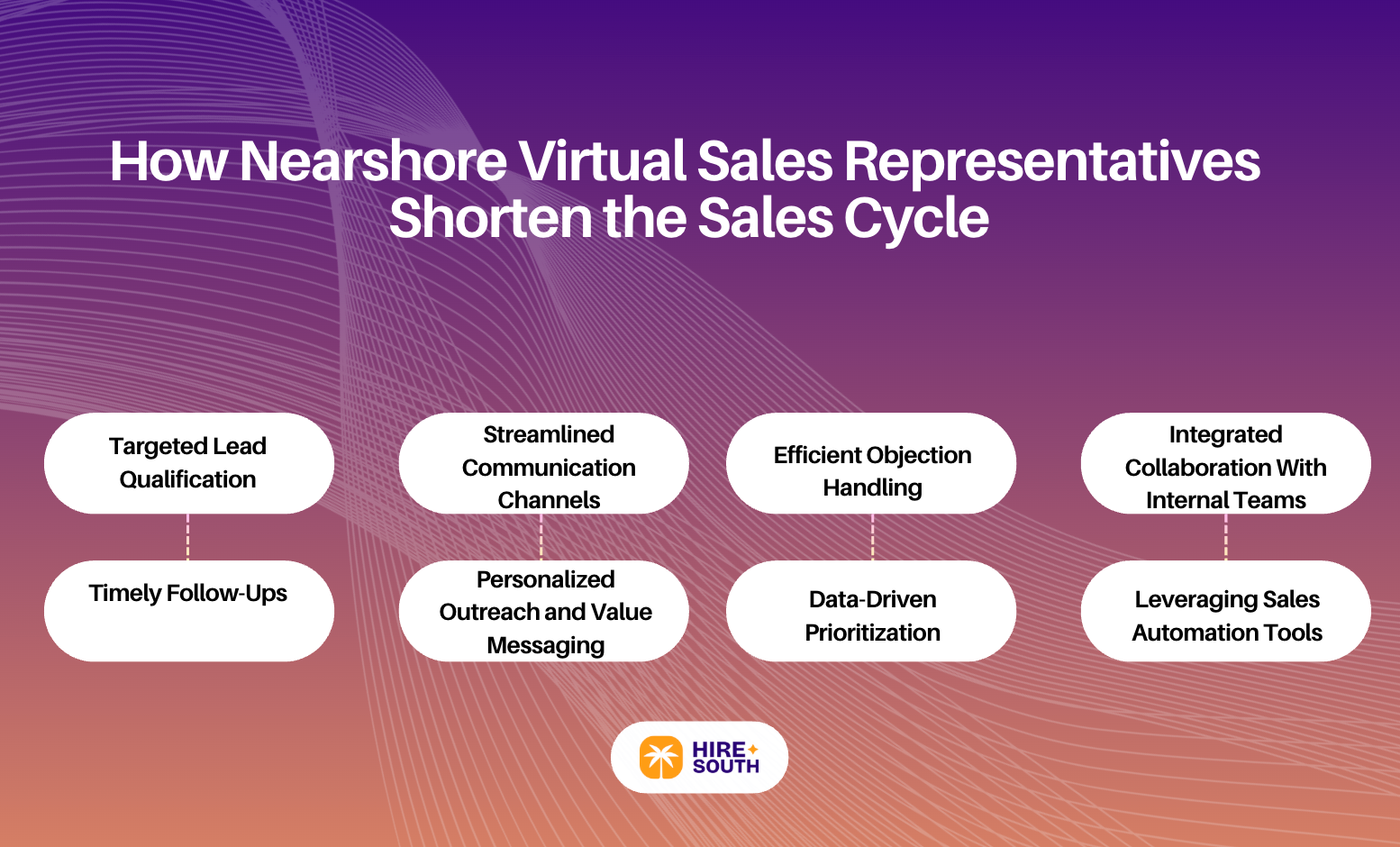Sales cycles are getting longer. In fact, 58% of businesses report that their sales cycles have extended in 2024, according to SaaStr. If your team is struggling to close deals quickly, nearshore virtual sales representatives could be the solution you need.
These remote professionals, often based in nearby countries with overlapping time zones and cultural similarities, can seamlessly integrate into your sales process. They handle everything from lead qualification to appointment setting and closing deals, all while reducing operational costs by up to 70% compared to domestic hires, according to Scale Army.
In this article, we'll explore how nearshore virtual sales teams can accelerate your sales cycle. We'll cover the role of remote closing teams, strategies to streamline your sales process, and tools that empower virtual sales reps. By the end, you'll understand how to leverage nearshore talent to boost efficiency and close deals faster.
Understanding the Role of Nearshore Virtual Sales Representatives
Nearshore virtual sales representatives are remote professionals located in neighboring countries, offering a strategic way to enhance your sales operations without the limitations of a local-only team. These specialists handle everything from lead generation and prospect research to CRM management and customer outreach, all while operating in time zones and cultural contexts that closely match your own.
Their responsibilities include identifying potential clients and expanding your sales pipeline using digital tools and targeted outreach. They maintain accurate records in your CRM system, ensuring every interaction is tracked and follow-ups happen on time. These representatives also coordinate appointments, nurture leads, and conduct virtual presentations or product demonstrations tailored to your prospects’ needs. Beyond direct sales tasks, they analyze market trends and competitor activity to inform smarter sales strategies and optimize performance.
One of the biggest advantages of nearshore virtual sales representatives is cost efficiency. Hiring in nearby countries can reduce labor costs by 30 to 70 percent compared to domestic hires while maintaining high performance, according to scalearmy.com. The alignment in time zones and cultural norms also ensures smoother communication with your team and clients, making collaboration more natural and reducing delays. Additionally, nearshore teams provide scalability, allowing you to adjust team size quickly to meet fluctuating business demands. Many nearshore regions offer a deep talent pool of skilled sales professionals, ensuring access to expertise without the long recruitment timelines typically associated with domestic hiring, according to hirewithnear.com.
Integrating nearshore virtual sales representatives into your sales strategy can streamline operations, accelerate lead-to-close timelines, and reduce operational costs, helping your business grow more efficiently.
Why Is It Positive To Accelerate Your Sales Cycle
Faster Revenue Generation.
Accelerating your sales cycle leads to quicker revenue realization. Shorter cycles mean deals close faster, allowing your business to generate income more rapidly. This swift revenue influx can be reinvested into growth initiatives, creating a cycle of continuous improvement and financial health.
Improved Cash Flow.
A shortened sales cycle enhances cash flow by reducing the time between initial contact and receipt of payment. This improvement in liquidity enables your business to manage expenses more effectively, invest in opportunities promptly, and maintain financial stability.
Increased Sales Capacity.
By closing deals more quickly, your sales team can handle a higher volume of prospects within the same timeframe. This increased capacity allows for more opportunities to be pursued, potentially leading to greater overall sales without the need to expand the team.
Enhanced Customer Satisfaction.
Accelerating the sales process can lead to faster responses to customer inquiries and quicker delivery of solutions. This efficiency often results in higher customer satisfaction, fostering stronger relationships and increasing the likelihood of repeat business.
Better Resource Allocation.
With a more efficient sales cycle, your team can allocate resources more effectively. Time and effort spent on prolonged negotiations are minimized, allowing focus on high-priority leads and strategic initiatives that drive growth.
Higher Conversion Rates.
Streamlining the sales process often leads to higher conversion rates. By removing unnecessary steps and focusing on qualified leads, your team can close more deals, improving the overall effectiveness of your sales strategy.
Improved Sales Forecasting.
Shorter sales cycles provide more data points in a given period, enhancing the accuracy of sales forecasts. With better forecasting, your business can make more informed decisions regarding inventory, staffing, and financial planning.
Competitive Advantage.
In fast-paced markets, the ability to close deals swiftly can provide a significant competitive edge. Businesses that accelerate their sales cycles can respond to market changes more effectively and capitalize on opportunities before competitors.
What Remote Sales Rep Skills Are Helpful For Companies?
1. Strong Communication Skills:
Clear and persuasive communication is crucial for remote sales representatives. You rely on their ability to explain products or services effectively, answer questions confidently, and build trust through written and verbal interactions. According to Salesforce, 79% of business buyers say effective communication directly influences their purchase decisions.
2. Time Management and Self-Discipline:
Remote sales reps often work independently, so managing their time efficiently is essential. You benefit when they can prioritize high-value leads, follow up promptly, and maintain consistent outreach without direct supervision.
3. CRM and Technology Proficiency:
Competence with CRM systems, sales automation tools, and virtual communication platforms allows remote reps to track leads accurately, update records in real time, and provide actionable insights. Your business sees faster deal closures when reps use technology to streamline follow-ups and maintain visibility into the sales pipeline.
4. Active Listening and Empathy:
Listening carefully to prospects and understanding their needs is critical. Remote reps who can identify pain points and tailor solutions increase conversion rates. Studies show that salespeople who actively listen close 50% more deals than those who focus only on pitching, according to HubSpot.
5. Problem-Solving and Adaptability:
You gain a competitive edge when remote sales reps can think critically, address unexpected challenges, and adjust their approach to different client scenarios. Adaptable reps respond quickly to changing market conditions, keeping your sales momentum steady.
6. Data-Driven Decision Making:
Remote reps who analyze metrics like response times, conversion rates, and pipeline velocity can optimize their approach. By leveraging data, you benefit from more efficient lead prioritization and smarter forecasting. Organizations using data-driven sales approaches report 6–8% higher revenue growth than their peers, according to McKinsey.
7. Persistence and Resilience:
Closing deals remotely requires persistence. You rely on reps who follow up consistently, handle rejection professionally, and maintain motivation. Resilient remote sales reps keep your pipeline active and prevent potential leads from slipping through the cracks.
8. Cultural Awareness and Language Skills:
For nearshore teams, cultural alignment and language proficiency are critical. Reps who understand regional business norms and communicate naturally with prospects build stronger relationships and reduce miscommunication, improving overall sales efficiency.
How Nearshore Virtual Sales Representatives Shorten the Sales Cycle

Targeted Lead Qualification:
Nearshore virtual sales representatives prioritize high-potential leads early. By analyzing data from your CRM, they focus efforts on prospects most likely to convert. This reduces time spent on low-value opportunities and ensures your sales team engages only with leads that can move through the funnel quickly. According to HubSpot, businesses that implement structured lead qualification see conversion rates increase by up to 30%.
Timely Follow-Ups:
Prompt follow-ups are critical in maintaining engagement. Nearshore reps use automated reminders and scheduling tools to reach prospects within hours of initial contact. Studies show that responding within the first hour increases the likelihood of conversion by 7 times compared to waiting even a day.
Streamlined Communication Channels:
You benefit when reps consolidate communication through efficient channels, such as video calls, instant messaging, and CRM-integrated email. This reduces delays caused by back-and-forth emails and ensures decisions move forward faster. Nearshore teams often leverage tools that allow real-time collaboration, cutting negotiation cycles significantly.
Personalized Outreach and Value Messaging:
Nearshore representatives tailor messages based on prospect behavior and preferences. Personalization builds trust and helps decision-makers see immediate value. Research by Salesforce indicates that 84% of customers say being treated like a person, not a number, increases their likelihood to buy.
Efficient Objection Handling:
Skilled nearshore reps anticipate common objections and prepare responses in advance. By addressing concerns quickly, you avoid stalled conversations and reduce the time it takes for prospects to commit. Training in objection handling has been shown to improve close rates by 18% on average, according to CSO Insights.
Data-Driven Prioritization:
Nearshore teams rely on analytics to prioritize tasks that yield the highest impact. By tracking metrics like engagement rates, deal stage duration, and response times, they adjust strategies to focus on opportunities that accelerate the sales cycle. Companies using data-driven sales strategies report up to 15% faster deal closures, according to McKinsey.
Integrated Collaboration With Internal Teams:
These representatives work closely with marketing, product, and client success teams. You gain efficiency when information flows seamlessly, reducing duplicated efforts and ensuring prospects receive consistent messaging. This integration accelerates the movement from initial contact to signed contract.
Leveraging Sales Automation Tools:
Automation is key to shortening sales cycles. Nearshore reps use tools to schedule emails, set reminders, and update CRMs automatically. This minimizes administrative tasks, allowing more time for direct engagement with prospects. Research shows that automation can reduce sales cycle length by 14–20%, according to SalesLoft.
Ready to Hire Virtual Sales Representatives?
Shortening the sales cycle is not only about closing deals faster, it’s about increasing efficiency across your entire revenue engine. Companies that reduce cycle length by even 10% often see measurable gains in revenue predictability and customer retention, according to McKinsey’s research on sales productivity.
At Hire South, we specialize in helping companies build their own nearshore remote teams to help them capture these gains. Our expertise in matching companies with skilled talent across Latin America ensures cultural alignment, cost efficiency, and measurable impact on sales performance. By leveraging our network and proven processes, you can scale faster, optimize resources, and move prospects from first contact to closed deal with greater consistency. Contact us to schedule a free consultation!

Ready to Hire LATAM Talent?
Let us do the legwork to find your perfect remote hire in Latin America!







.svg)